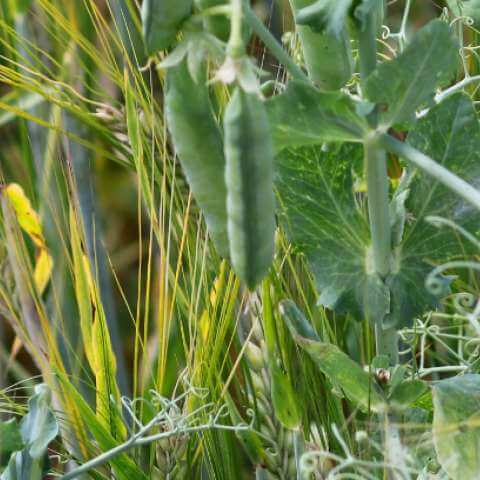Intercropping is an ancient agricultural technique where two or more plant species are grown simultaneously in the same field. This method of farming can increase crop yields, reduce the need for synthetic fertilizers, improve soil health and increase biodiversity. Despite its environmental and economic benefits, intercropping is still a niche practice in the EU. The LEGUMINOSE project wants to change that by establishing intercropping as a climate-smart farming practice.

- Project ID: 101082289 https://cordis.europa.eu/project/id/101082289
- Programme: HORIZON
- Call: HORIZON-CL6-2022-BIODIV-01
- DG/Agency: REA
Abstract
As conventional cropping systems face deterioration of soil quality, loss of biodiversity, and declining ecosystem services, there is an urgent need to change practices to more sustainable yet productive systems. Intercropping enhances biodiversity, maximizes land productivity, and optimizes biogeochemical cycles in agroecosystems, but is lacking acceptance from European farmers. Legume-based intercropping takes advantage of biological diversity and synergistic effects between companion plants while reducing external inputs. A major objective of LEGUMINOSE is to identify the obstacles to intercropping and enhance farmers’ acceptance by providing knowledge and demonstrations that promote economic, environmental, and social benefits of legume-cereal intercropping. LEGUMINOSE will assess intercropping potential by focusing on pesticide reduction, plant-microbe mediated element cycling, soil health improvement, and crop quality and health. To overcome barriers to intercropping implementation, we will establish a network of six field trials and farm labs (20 farms in each country; 180 on-farm trials) in different pedo-climatic zones across Europe (IT, DE, DR, ES, PL, CZ, UK), Egypt, and Pakistan. Furthermore, we will integrate remote sensing and crop modelling to survey fields, upscale the field-scale results, and create a web-based decision support system on intercropping. In collaboration with various stakeholders, legume-intercropping systems' economical, ecological, and social gains will be assessed and disseminated with international outreach from farm-level to policymakers. We will recognize and involve the whole value chain to explore and test innovative marketing strategies for the products of intercropping. LEGUMINOSE will contribute to the ecological intensification of European agriculture by providing science-based, farmer-led, and economically viable transformations for legume-based intercropping systems.
Participants
- UNIVERSITA DEGLI STUDI DI FIRENZE - UNIFI(999895789) - COORDINATOR
- AGENCIA ESTATAL CONSEJO SUPERIOR DE INVESTIGACIONES CIENTIFICAS - CSIC(999991722) - BENEFICIARY
- INSTYTUT AGROFIZYKI POLSKIEJ AKADEMII NAUK - INSTITUTE OF AGROPHYSICS POLISH ACADEMY OF SCIENCE(997770228) - BENEFICIARY
- GOTTFRIED WILHELM LEIBNIZ UNIVERSITAET HANNOVER - LUH(999981828) - BENEFICIARY
- UNIVERSITAET FUER BODENKULTUR WIEN - BOKU(999987357) - BENEFICIARY
- TECHNISCHE UNIVERSITAET WIEN - TU WIEN(999979888) - BENEFICIARY
- EUROPEAN SCIENCE COMMUNICATION INSTITUTE (ESCI) GGMBH - (916295951) - BENEFICIARY
- DEUTSCHE SAATVEREDELUNG AG - (986460513) - BENEFICIARY
- UNION DE PEQUENOS AGRICULTORES Y GANADEROS - UPA(937914535) - BENEFICIARY
- IFAU APS - INSTITUTE FOR FOOD STUDIES & AGROINDUSTRIAL DEVELOPMENT(945453375) - BENEFICIARY
- AGRITEC PLANT RESEARCH S.R.O. - (896918067) - BENEFICIARY
- AARHUS UNIVERSITET - AU(999997736) - BENEFICIARY
- FARM EUROPE AISBL - Farm Europe(927734094) - BENEFICIARY
- CONFEDERAZIONE ITALIANA AGRICOLTORI TOSCANA - (950484571) - BENEFICIARY
- GOVERNMENT COLLEGE UNIVERSITY FAISALABAD - GOVERNMENT COLLEGE UNIVERSITY FAISALABAD(887482683) - BENEFICIARY
Keywords:
Ecological intensification, Biodiversity, Legume, Plant-Soil-Microbe Interaction, Cereal, Climate change Mitigation, Plant health, Soil fertility
The Leguminose project will provide science-based, farmer-led, and economically viable systems and techniques for legume-cereal-based intercropping. This Horizon Europe project is funded by the EU (2022–2026). Views expressed do not necessarily reflect the opinion of the European Commission.
ESCI leads the communication, dissemination, and engagement activities. This includes identifying the communication needs of specific audiences and developing appropriate communication and dissemination tools to raise awareness for the goals and results of the LEGUMINOSE project and the practise of intercropping in general.
Twitter Linkedin www.leguminose.eu